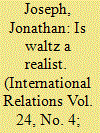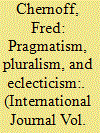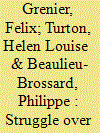|
|
|
Sort Order |
|
|
|
Items / Page
|
|
|
|
|
|
|
| Srl | Item |
| 1 |
ID:
101517


|
|
|
|
|
| Publication |
2010.
|
| Summary/Abstract |
In the opening chapter of Theory of International Politics Waltz makes an interesting distinction between scientific laws and theory construction. Recent special issues of this journal have suggested that this distinction allows Waltz to be read in different ways - for example, as a scientific realist who conceives of unobservable entities, or as a constructivist interested in how we create models. This contribution argues against both these interpretations by analysing the first chapter of Waltz's book and suggesting that his distinction between theories and law-like statements is fully consistent with mainstream discussions in the philosophy of social science. It argues that Waltz's position still depends on the identification of empirical regularities, something that makes him an empirical realist, but which undermines the claim that he is a scientific realist.
|
|
|
|
|
|
|
|
|
|
|
|
|
|
|
|
| 2 |
ID:
175155


|
|
|
|
|
| Summary/Abstract |
This paper seeks to show ways in which analytic eclecticism can be strengthened to encourage hybrid theorizing capable of yielding more practically useful principles for foreign policy decision-makers. The paper also seeks to show that some of the advantages of analytic eclecticism are overstated, notably the ability to sidestep difficult questions in the philosophy of social science. Nevertheless, with a proper deepening of their discussion of pragmatism, the core of the practical consequences of analytic eclecticism can be advanced with greater force and with a strengthened methodological rationale.
|
|
|
|
|
|
|
|
|
|
|
|
|
|
|
|
| 3 |
ID:
164453


|
|
|
|
|
| Summary/Abstract |
Discourse analysis offers an extremely diversified landscape, spanning time and disciplines far beyond the field of international relations (IR). With a rich lineage, it comes as no surprise that under the label “Discourse Analysis” (DA) one cannot find a unified theoretical family within IR but rather a plurality of heterogeneous ways of approaching discourse analysis. By leveraging the wealth of discourse analytical works accumulated over more than three decades, this article intends to discuss some of the main theoretical tenets of three competing perspectives on discourse analysis (PDAs): constructivism, critical realism and poststructuralism. It does so by tracing their links to their respective putative philosophical referents. Distinct from Milliken (1999), who consciously stresses the commonalities between various PDAs, this contribution identifies the differences between them. The paper proceeds as follows. First, it locates IR PDAs in the framework of debates over the core branches of the philosophy of social science. Constructivist, poststructuralist and critical realist PDAs will be located along both a foundational/nonfoundational ontological continuum and a positivist/post-positivist epistemological continuum. Secondly, it retraces the main tenets of post-structuralist, constructivist, and critical realist PDAs to discourse by identifying the relevant debates that have characterized the approach to discourse analysis in IR. Finally, it presents some methodological guidelines and provides examples on how DA endeavors have been practiced.
|
|
|
|
|
|
|
|
|
|
|
|
|
|
|
|
| 4 |
ID:
140112


|
|
|
|
|
| Summary/Abstract |
Since the inception of International Relations (IR) within university departments, its disciplinary status has been the subject of constant debate. Yet, the current literature on ‘the state of the discipline’ silences this debate either through IR’s assumed disciplinarity or conflation of debates about theory with the existence of IR. This Forum moves beyond this literature by explicitly engaging whether IR is a discipline or not and by enquiring how this status matters. Contributors rely on the sociology and philosophy of social science to call into question or affirm the disciplinarity of IR to argue whether IR is as a subfield of Political Science, a full-blown and autonomous discipline, or a hybrid field of interdisciplinary studies. Furthermore, contributors reveal the implications of the different disciplinary statuses regarding the academic institution, interdisciplinary possibilities and modes of organizing IR. Overall, these contributions aim to engage rather than close the disciplinary debate, creating further space for reflection.
|
|
|
|
|
|
|
|
|
|
|
|
|
|
|
|
|
|
|
|
|